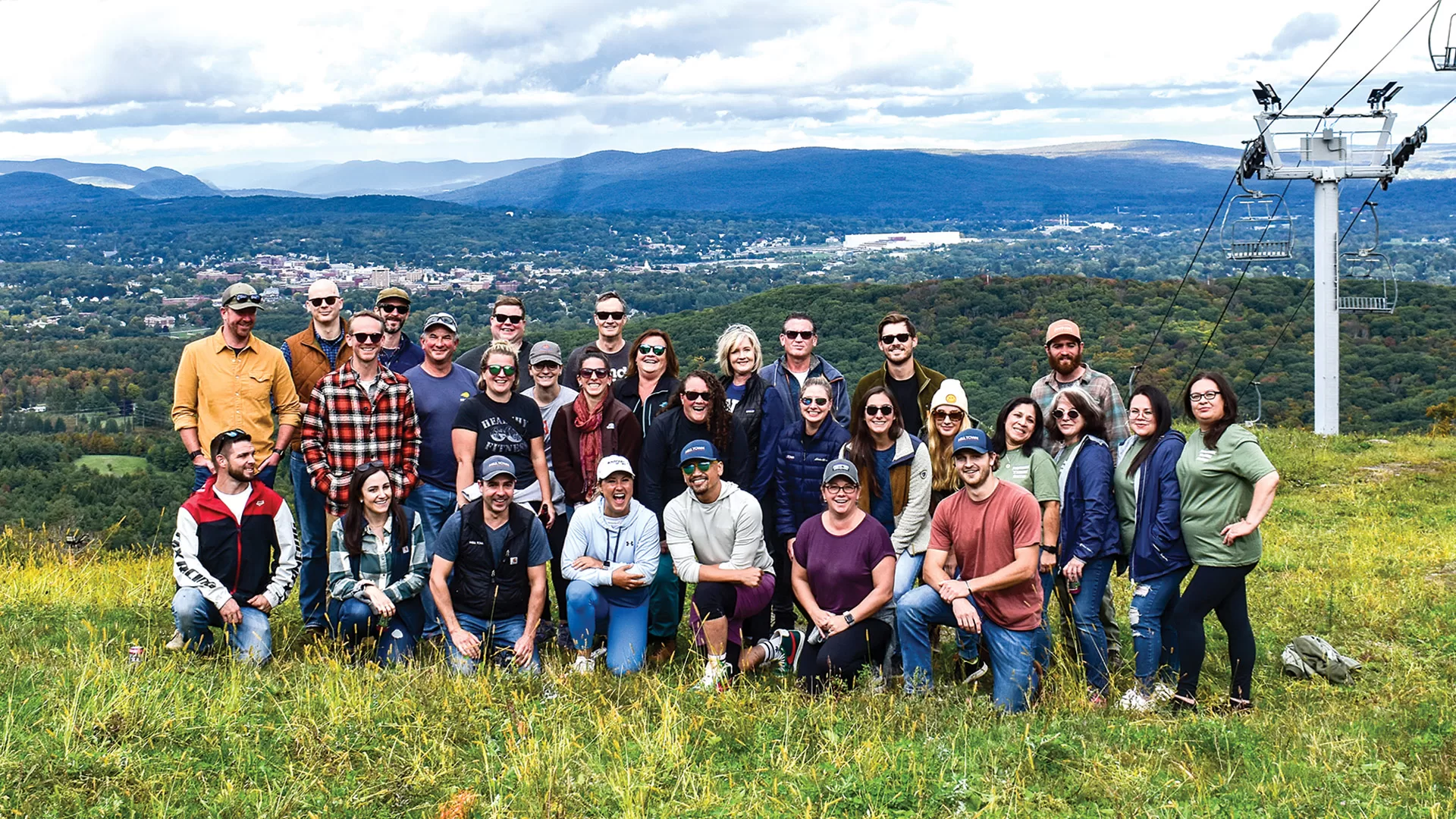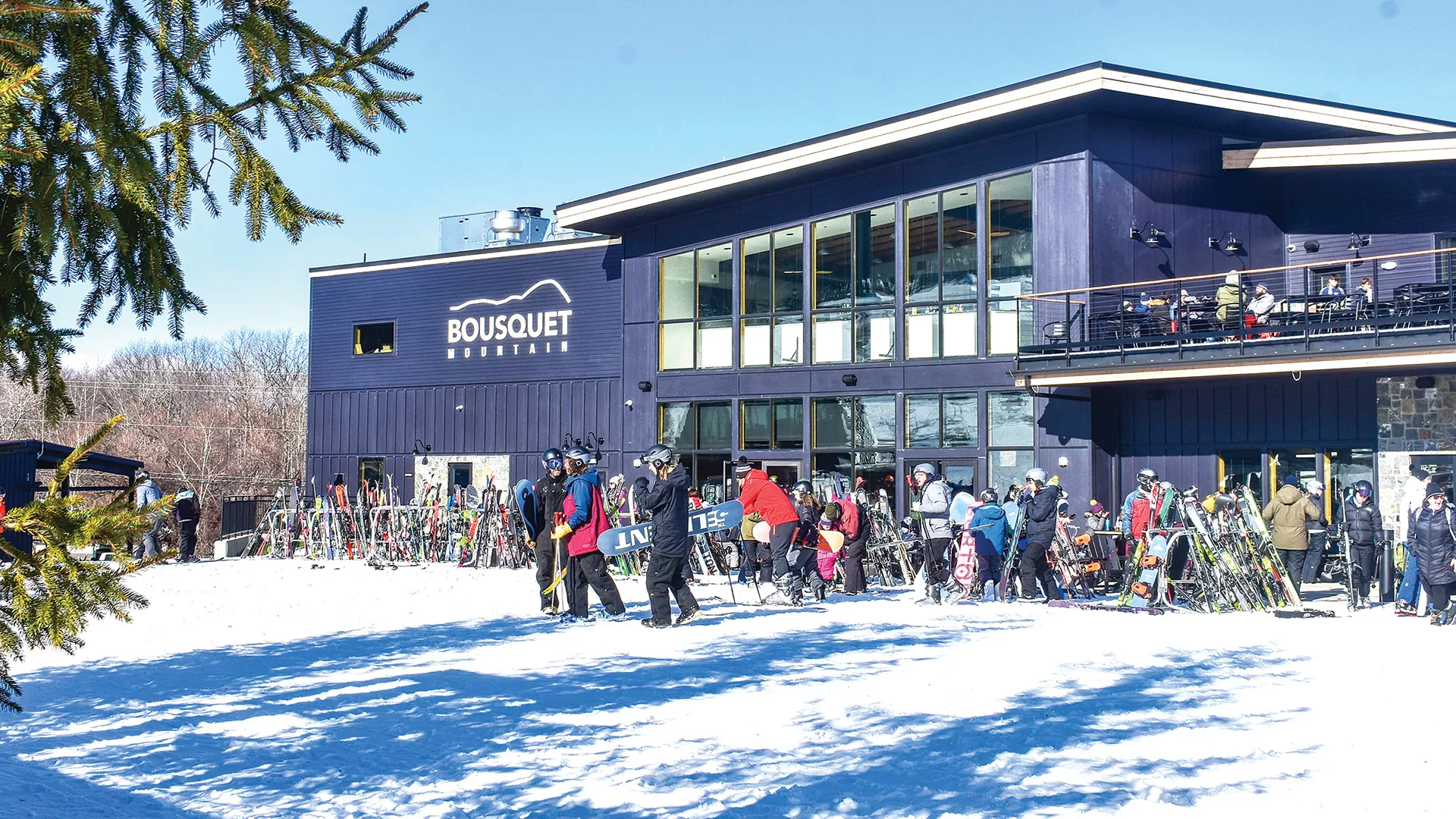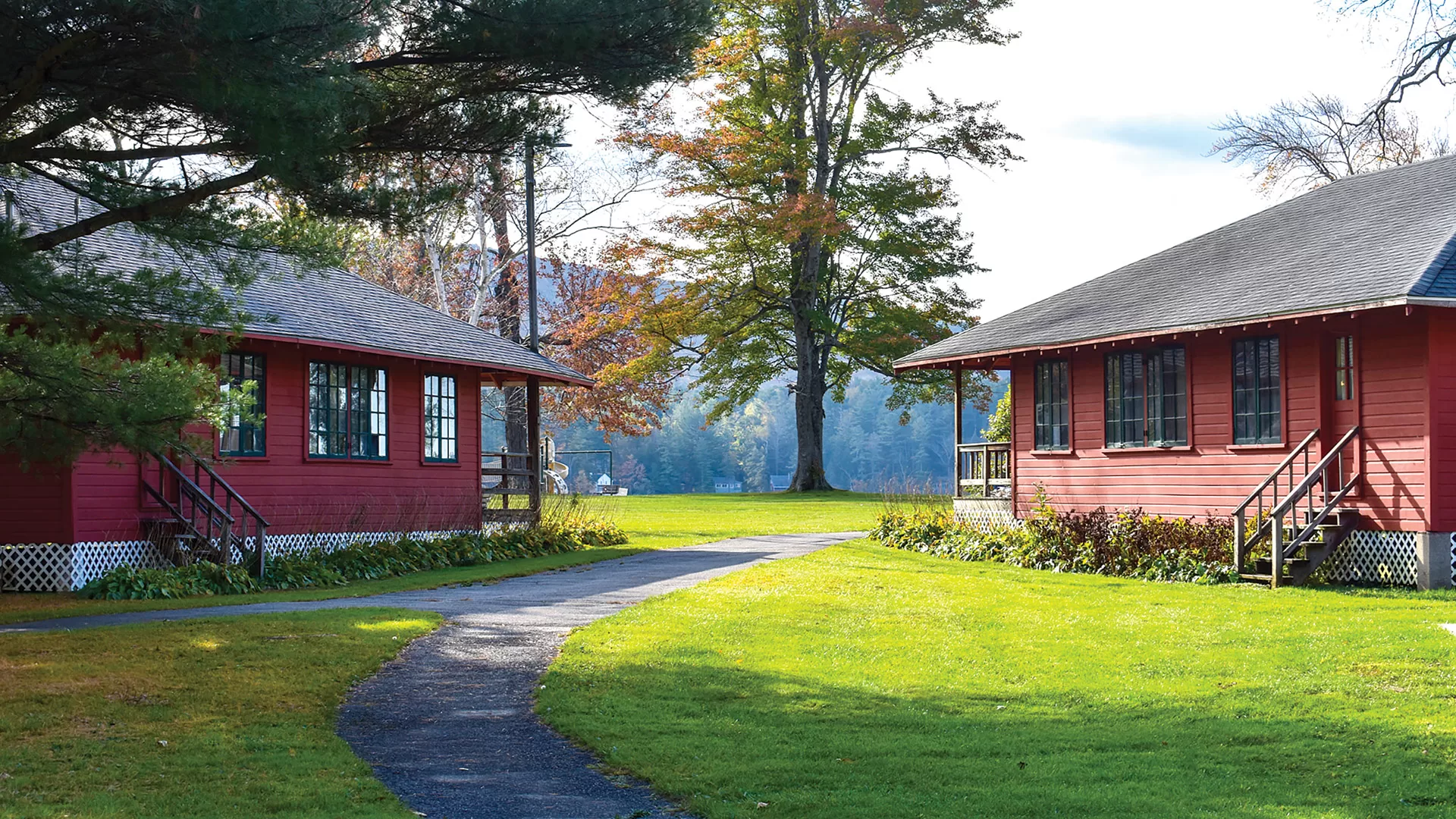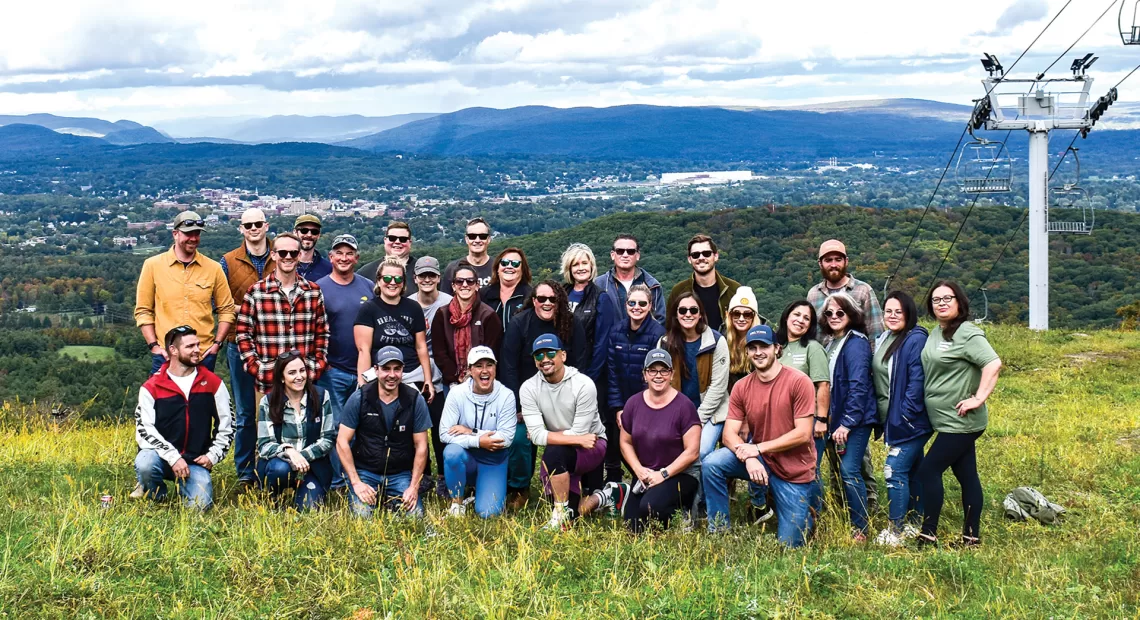A Visionary Approach

The Mill Town Capital team atop Bousquet Mountain Ski Area.
Real-estate development can be a profitable business. In fact, it’s safe to say that’s the key driver for most players in this sector.
For the team at Mill Town Capital, it’s about impact — on more than the bottom line.
Formed in 2016 and based in Pittsfield, Mill Town is an “impact investment platform,” said Tim Burke, the company’s CEO. “Our overall mission and mandate is to really make the area of Pittsfield and the Berkshires a better place to live through traditional investments, impact investments, and pure philanthropic community work.”
But what is impact investment?
“To us, impact investment means focusing on key assets or amenities or projects that have a high potential positive impact on the region,” he explained. “So it’s a little bit different than maybe a traditional impact investment that might look at energy or other areas of impact. Ours is really place-based in terms of our approach.
“When we think about impact, it’s taking on investments that most traditional investors wouldn’t take on either because the rate of return is lower, or it takes a much longer time to realize it, or they’re just really difficult projects,” he added. “We’re not necessarily restrictive to different sectors or industries. It’s really about, is this project good for the region? Is it good for the local economy? Does it have the chance to spur economic development or other potential investment, and, if so, how can we make it work?”
The company’s first ventures into real estate centered on housing-development projects in Pittsfield.
“Impact investment means focusing on key assets or amenities or projects that have a high potential positive impact on the region.”
“Pittsfield used to be a 60,000-person city, but now has 40,000 people. So you would think that there is enough housing for everyone, but the stock itself is significantly deteriorated,” Burke explained. “You have a lot of really old stock, things that are run down, properties where absentee landlords have a lot of deferred maintenance. And the living conditions in some of these are really tough.”
Since taking what he called a “clustered approach” to housing stock in the area, Mill Town has accumulated more than 200 units of housing in Pittsfield alone, as well as a few commercial buildings and mixed-use properties, with apartments on the upper floors and commercial space on the lower floors.
“So the real-estate approach there has been trying to improve neighborhoods with housing at the forefront, but also supporting small businesses and restaurants where we can.”

Tim Burke calls the Bousquet complex “a critical local asset that had fallen on some tough times.”
Public investment has sometimes followed that private investment, Burke said, with the city or state coming in with utility upgrades or streetscape improvements.
“So it’s really a multi-faceted approach, and it certainly has a patient-capital component to it as well, where we’re not looking to get in and monetize things really quickly. We have more of a patient, long-term approach to it.”
On the business-enterprise side of the ledger, Mill Town now owns about a dozen local businesses, either directly or in partnerships.
One example is Bousquet Mountain Ski Area, one of the oldest continuously operating ski areas in the country. “We felt that’s a great example of a critical local asset that had fallen on some tough times and needed a lot of investment,” Burke said. “I don’t think many rational investors would have gone in there with a pure investment business case, but we felt like it was worth saving.”
These enterprise investments tend to be clustered in regional assets in real estate, recreation, and hospitality, such as the Central Downtown Inn & Suites in Pittsfield; Gateways Inn in Lenox; Blueprint Property Group in Pittsfield; Framework, a Pittsfield co-working space; and others — about a dozen in all.
“We’ve been involved in those types of projects for a number of years, some of which are business-oriented projects, and some are philanthropic, that we do through our our 501(c)(3) foundation. That includes things like improvements in Springside Park, which is a large, local park in Pittsfield where we helped reshape and reinvest in trail networks there.”
Tim Burke
“Is this project good for the region? Is it good for the local economy? Does it have the chance to spur economic development or other potential investment, and, if so, how can we make it work?”
Mill Town has also provided contributions to the Berkshire Natural Resources Council for a project that connects the various trail networks in the Berkshire mountains.
“And then we have two businesses that are in the recreation space,” Burke said. “We own an athletic center that’s called Bousquet Sport, which is across the street from the ski area, where we’re currently undergoing a 15,000-square-foot addition plus renovation to the facility, and that’s an investment in tennis, fitness, and pickleball.”
Then there’s Camp Arrow Wood, where the former Lakeside Christian Camp on Richmond Pond was converted into a new, sleep-away summer sports camp.
“We run three- and six-week summer camp sessions out of that property. That’s another project that we kind of uncovered during the COVID period … and we’ve been building that up over the past year and a half or so.”
Coming Home
Prior to Mill Town, Burke spent a number of years in corporate finance roles with United Technologies and then later with a couple different biotechnology companies, most recently Biogen in Boston’s Kendall Square biotech cluster.

Mill Town transformed the former Lakeside Christian Camp on Richmond Pond into Camp Arrow Wood, a new, sleep-away summer sports camp.
But his connection to Pittsfield was strong, having grown up there, and around 2015, he met Dave Mixer, Mill Town’s founder “and really kind of the motor and the initiative and the capital behind everything that we do,” Burke said. “So I ended up meeting with Dave, and he had a general idea of what he wanted to do.”
Mixer, like Burke, is a Berkshire native and had just come back to the area after being away for a long period of time, and he wanted to make an impact, Burke explained.
“His view of making an impact is a little bit non-traditional from a philanthropic standpoint. He didn’t want to just write checks and then walk away. He really wanted to see if he could drive economic development and job growth and population stabilization and new housing and educational improvements — all across the spectrum of economic development and quality of life.
“It’s been a great, challenging, unique run for us over the past six or seven years, and we’re at a point now where, through Mill Town and our businesses, we employ over 300 people in the area. We’re constantly looking to grow and make this engine work and also kind of preach what we’ve learned over the years to other communities and people and investors and philanthropists and see if there are ways we can help other areas progress with what we’ve done in Pittsfield.”
“I think we’re pretty hard on ourselves in that we think we have a ways to go before we achieve the impact that we want to achieve. But it is validating to a certain degree that people see that we’re heading in the right direction.”
Indeed, Burke firmly believes Mill Town has a replicable model, but it’s one that’s still evolving. “We think we’re in the second or third inning of what we’re doing here in Pittsfield.”
And as someone with a lifelong heart for the city, he envisions what a vibrant, thriving Pittsfield can one day be.
“I think it’s a place where people from all aspects of the economic spectrum can find quality housing. They can send their kids to schools and get them a good education. They can find jobs that will allow them to live here productively and raise a family.
“And then we can provide those systems on the periphery that allow people to have a good quality of life here — places where kids have opportunities to have athletic endeavors in camps, places where adults can enjoy the natural assets that the area has,” he went on. “That comes back to trail networks and all the outdoor recreation assets that we have here.”
After all, he added, those are some of the things the Berkshires are most known for.
“Making sure that we can maximize those benefits for the people of Pittsfield is where we want to make a difference,” Burke told BusinessWest. “That involves a lot of different things and broader socioeconomic issues that are much harder to solve, like education and poverty and addiction. But we still should try to get involved in some of those things through partnerships with organizations who have that expertise.”
Moment of Recognition
Last fall, at 1Berkshire’s Celebrate the Berkshires event, Mill Town Capital was recognized as a special honoree for “putting the Berkshires on the map” — an honor that recognized the company’s investments in housing and downtown redevelopment, as well as its philanthropic support around the region.
“When our regional economic-development group recognized Mill Town for the work that we’re doing, it was tremendously gratifying for our team to see that people see the work that we’re doing and that it is having a positive impact,” Burke said. “I think we’re pretty hard on ourselves in that we think we have a ways to go before we achieve the impact that we want to achieve. But it is validating to a certain degree that people see that we’re heading in the right direction.
“That hasn’t always been the case,” he added. “I think when we first started out, there was a lot of skepticism and questioning: ‘what’s the angle?’ ‘What are you trying to accomplish?’ So it was great to see that, at a minimum, people view it as positive-intent work that has the potential to drive change.”






